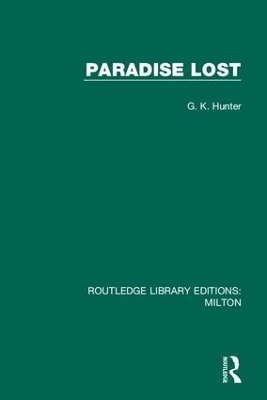First published in 1980. Paradise Lost was once a favourite text for family reading; today it is confined to the educational system, which treats it as an object to be investigated rather than a subject that demands response. Professor Hunter writes inevitably for an audience of literary students, but he invites them to consider Paradise Lost as a text that must be enjoyed before it can be explained. He understands the need to explain complexities, but is mainly concerned with the onward flow of our engagement with an ancient poem. Milton's narrative technique is explored as a system which both encourages and frustrates our native sense of story. His poetic power is shown to grow from our assent to its brilliant evocation of "as if" fictions. Milton is a master of audience manipulation, of dramatic tension and intellectual paradox. These characteristics are described in the context of the task the poem sets itself to tell the untellable and describe what no man has ever seen. The power of Milton's art is traced through his rehandling of Homer and Virgil and in his daringly individual fidelity to scripture. Professor Hunter does not try to smooth away the contradictions inherent in Milton's ambition to write an English classical Christian epic. He rather stresses the contradictions as cues to a properly alert reading. And this is what the book aims at above all a response to Paradise Lost which is alert to poetry and unintimidated by scholarship.
- ISBN10 0367142937
- ISBN13 9780367142933
- Publish Date 23 January 2019 (first published 7 August 1980)
- Publish Status Active
- Publish Country GB
- Publisher Taylor & Francis Ltd
- Imprint Routledge
- Format Hardcover
- Pages 220
- Language English
